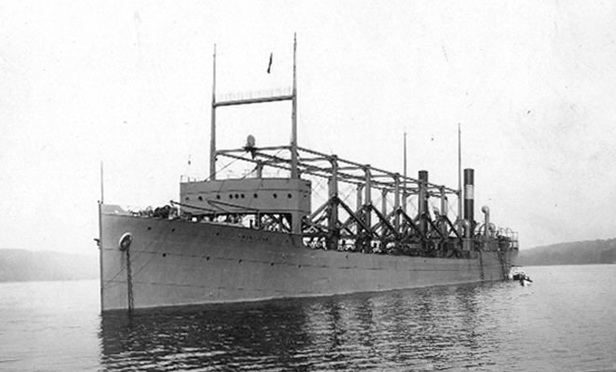James E Mercante

October 28, 2016 | New York Law Journal
Bermuda Triangle: Trick or Trap?Admiralty Law columnist James E. Mercante explores the myths and the legal challenges surrounding the Bermuda Triangle, a triangle shaped by a line drawn from Bermuda to Miami to Puerto Rico and considered a haunted part of the sea claiming ships without a trace. Instead of being gone forever, ships that go down in the Bermuda Triangle are not forgotten. Federal court, in admiralty, is where the mysterious disappearances and sinkings surface to eerily re-create the voyage and the cause of loss.
By James E. Mercante
20 minute read

July 25, 2016 | New York Law Journal
Treasure at Sea: Finders Are Not Always KeepersIn his Admiralty Law column, James E. Mercante of Rubin, Fiorella & Friedman discusses a recent case in which a U.S. government data buoy detached from its mooring anchor at sea and was discovered by the captain of a fishing vessel. As the vessel owner quickly learned, sea rights are determined by federal maritime law and "finders" are rarely "keepers".
By James E. Mercante
22 minute read

February 24, 2016 | New York Law Journal
Admiralty's Arsenal: Limitation of LiabilityIn his Admiralty Law column, James E. Mercante writes: Maritime law is truly a unique animal. It has its own set of federal rules, special remedies and relief, its own 'parlance', and is one of only two law specialties mentioned in the U.S. Constitution. One of the 'oldies but goodies' in the practitioner's arsenal is the ability to limit the liability of a vessel owner to the post-casualty value of the vessel.
By James E. Mercante
12 minute read

October 14, 2015 | New York Law Journal
El Faro's Sinking Stirs Jones Act DebateIn his Admiralty Law column, James E. Mercante writes: The Merchant Marine Act is a 'preference' for the U.S. shipping industry requiring, among other things, that vessels transiting between U.S. ports be built in the United States, carry a U.S. flag, employ an American crew and have an American owner. Almost a century later, the law remains on its feet despite some heavyweight opponents, many of whom point to its effects, including two stark examples this year.
By James E. Mercante
11 minute read

April 01, 2015 | New York Law Journal
Arbitrating Seamen's Personal Injury ClaimsIn his Admiralty Law column, James E. Mercante writes that while arbitration to resolve commercial maritime disputes is quite common, an injured seaman typically enjoys a trial by jury, a right codified by the Jones Act. Some vessel owners are advancing new arguments to replace antiquated notions with current realities.
By James E. Mercante
10 minute read

March 31, 2015 | New York Law Journal
Arbitrating Seamen's Personal Injury ClaimsIn his Admiralty Law column, James E. Mercante writes that while arbitration to resolve commercial maritime disputes is quite common, an injured seaman typically enjoys a trial by jury, a right codified by the Jones Act. Some vessel owners are advancing new arguments to replace antiquated notions with current realities.
By James E. Mercante
10 minute read

May 15, 2014 | New York Law Journal
Death Before Dishonor: Go Down With the Ship?In his Admiralty Law column, James E. Mercante writes: It has long been the lore of the sea that the 'captain goes down with the ship.' But, is there any 'law' behind that lore?
By James E. Mercante
7 minute read

October 31, 2013 | New York Law Journal
New Test in Longshore Worker's Attempted Suicide 'Unchained'In his Admiralty Law column, James E. Mercante, a partner at Rubin, Fiorella & Friedman, writes: Imagine being so physically and mentally traumatized by a personal injury that the thought of suicide becomes a reality. Worse yet, imagine acting on the idea and failing. The scenario presents a perplexing legal challenge in the field of Workers' Compensation. Indeed, one such case remains unresolved 10 years after a longshore worker's suicide attempt, but a recent ruling may put the issue to rest.
By James E. Mercante
8 minute read

April 12, 2012 | New York Law Journal
In the Wake of 'The Titanic': An Unsinkable LawIn his Admiralty Law column, James E. Mercante, a partner at Rubin, Fiorella & Friedman, writes that today marks the 100th anniversary of the sinking of the ocean liner RMS Titanic, with the loss of 1,517 lives. Apart from the memory of a high-seas disaster, he reports, what remains forever steadfast is the law that surfaced from the casualty.
By James E. Mercante
10 minute read

January 18, 2013 | New York Law Journal
Italy Cruise Ship Lawsuits Unlikely to SurviveIn his Admiralty Law column, James E. Mercante, a partner at Rubin, Fiorella & Friedman, writes that in any Costa Concordia cases filed here, a court will evaluate fundamental fairness by reference to the flag of the ship, the nationality of the ship's officers, the ports of departure and arrival, accident location, and the operator's principal place of business, and these all point to Italy.
By James E. Mercante
10 minute read
Trending Stories
- 1Gibson Dunn Sued By Crypto Client After Lateral Hire Causes Conflict of Interest
- 2Trump's Solicitor General Expected to 'Flip' Prelogar's Positions at Supreme Court
- 3Pharmacy Lawyers See Promise in NY Regulator's Curbs on PBM Industry
- 4Outgoing USPTO Director Kathi Vidal: ‘We All Want the Country to Be in a Better Place’
- 5Supreme Court Will Review Constitutionality Of FCC's Universal Service Fund
More from ALM
- Legal Speak at General Counsel Conference East 2024: Match Group's Katie Dugan & Herrick's Carol Goodman 1 minute read
- Legal Speak at General Counsel Conference East 2024: Eric Wall, Executive VP, Syllo 1 minute read
- Legal Speak at General Counsel Conference East 2024: Virginia Griffith, Director of Business Development at OutsideGC 1 minute read



